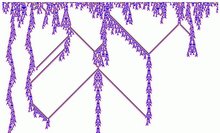
May Day
It's Lady Day again! Come Spring!
Come all ye patience handsel blooms!
Bring forcing gardens' flow'ring quince!
Bring hot house bulb and lilies, too!
Bring Holy Mary's crown again,
a flow'ring diadem - come Spring!
The cold and rains of April past;
come unnamed flowers all!
together with your namèd kin:
the rose, the daffodil, and pink,
and sweet those fragrant dandies in
the lawns so newly green;
this crown of May will last!
May God Almighty bless us all!
Conserve us safe from harm!
And all the Saints step forth! Attest!
conjoined in joyful choirs and lit-
anies assembling, breaking forth in song!
Pray save us from our Fall!
Mom Mary strides forth like Orpheus
and takes hell's subway ride
to stand beside her faithful folk
in Time's still darkling fields of War,
to nurse the bleeding, wounded souls to health;
restore the World to peace renown!
notes:
handsel
a gift or reward; here a reward for enduring winter; a Scots word, I believe.
Sometimes I use it with the sense of mitzvah, or a blessing: a divine reward.
It's Lady Day again! Come Spring!
Come all ye patience handsel blooms!
Bring forcing gardens' flow'ring quince!
Bring hot house bulb and lilies, too!
Bring Holy Mary's crown again,
a flow'ring diadem - come Spring!
The cold and rains of April past;
come unnamed flowers all!
together with your namèd kin:
the rose, the daffodil, and pink,
and sweet those fragrant dandies in
the lawns so newly green;
this crown of May will last!
May God Almighty bless us all!
Conserve us safe from harm!
And all the Saints step forth! Attest!
conjoined in joyful choirs and lit-
anies assembling, breaking forth in song!
Pray save us from our Fall!
Mom Mary strides forth like Orpheus
and takes hell's subway ride
to stand beside her faithful folk
in Time's still darkling fields of War,
to nurse the bleeding, wounded souls to health;
restore the World to peace renown!
notes:
handsel
a gift or reward; here a reward for enduring winter; a Scots word, I believe.
Sometimes I use it with the sense of mitzvah, or a blessing: a divine reward.
Orpheus
Orpheus descended even into Hades to rescue his beloved Eurydice.
So does Mary hazard all for her children.
The meter is odd and seems to change, the 5th lines lengthening in the last two stanzes.
I'm not sure why I did this. It's pretty much still hot from the oven, though.
Today I was helping my father with his gardening, a chore which he makes exhausting because the plan is in his head, but it comes out piece by piece, and there is a lot of walking about and talking about the ravages of winter, the harm the snow plows have done, the water level of the river, and so on.
So I have to pray for patience and humility, being by nature impatient and demanding.
While walking under the cherry tree, it dawned on me today was May Day. I stopped walking and he looked at me. He asked me what I was doing. I said I was praying to Our Lady, because it was May Day, and I had forgotten. I forget what the prayer was. I just stopped and prayed something or somehow - I don't really analyze it - then started back walking.
He is a church goer, but I don't think he's used to people suddenly stopping and praying.
When we had finished, I started to think about the poem for this week, and this came flying by - a handsel or reward for being a nice guy.


2 comments:
I've never seen Mary associated with May Day. Is that your invention? There's a lot I don't know about, maybe a Catholic tradition?
A formal poem is nice for seasonal celebratory verse. There is no hint of placement in time until the final stanza, so when you introduce "Mom Mary" and "subway" - I felt ready for it, to be brought back to the present from the this-could-be-anytime sense leading to it.
The note about your father adds a lot, so glad you included it. Just in that brevity I felt the distance of generations and worldviews, but also the connectedness of kin.
Right. May 1 is Lady Day, the Lady being Mary. Old, old Catholic tradition. We used to have May crownings where a chosen young girl would put a crown of flowers upon the head of her statue, and the rest of us would sing hymns.
You're right about how the last stanza jerks us into the present. I wondered about it at the time, but decided it had to be like that, because what's the good of it all if it is not here with us?
There is a tradition of describing holy things as being hands-on when the universe was created, but after that, God was upstairs, and the staff downstairs did the dirty work.
To me, that is a conceptual crucifixion: a death of holiness. Mary is right there, sweating it out with us.
Post a Comment